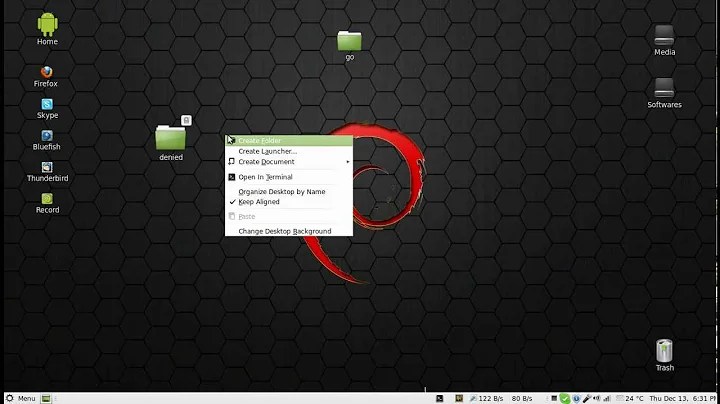How to solve "permission denied" when using sudo with redirection in Bash?
Solution 1
Output redirection (via the > operator) is done by the shell, not by echo. You have to login as root
sudo -i
Then you can use redirection
echo N> /sys/module/drm_kms_helper/parameters/poll
Otherwise you can run bash string with sudo
sudo bash -c "echo N> /sys/module/drm_kms_helper/parameters/poll"
Solution 2
The output redirection is done by the shell from which the command has been invoked. So, breaking everything into bits, here what is happening*:
shell invokes
sudo echo "options drm_kms_helper poll=N", which executessudocommand withecho "options drm_kms_helper poll=N"command linesudo asks for a password, opens superuser shell and invokes
echo "options drm_kms_helper poll=N", which runsechocommand passing it"options drm_kms_helper poll=N"echo, running with
rootprivileges, prints the string to its standard output.echocommand terminates, superuser shell exits,sudoterminatesthe shell from which the command has been invoked collects the output and tries to redirect it to
/etc/modprobe.d/local.conf, which is writeable only by root. It gets "permission denied" error.
For the ways to fix this see @shantanu answer.
(*) - while the above sequence helps to understand why the command fails, in reality things happen somewhat out-of-order: the original shell notices the redirection and tries to open the file for writing before invoking the sudo ... command. When opening the file fails the shell doesn't even invoke the command which was supposed to write to the file (thanks to @PanosRontogiannis for pointing this out).
Here's a quick test:
$ touch ./onlyroot.txt
$ sudo chown root:root ./onlyroot.txt
$ sudo bash -c "whoami | tee who.txt" > onlyroot.txt
bash: onlyroot.txt: Permission denied
In the test above the whoami | tee who.txt was going to create a file named who.txt containing the word "root". However, when the output redirection fails in the calling shell, "who.txt" file is also missing because the command was not invoked.
Solution 3
You can use a tee command like this:
sudo tee /sys/module/drm_kms_helper/parameters/poll <<<10
Or if its a command's output:
echo 10 | sudo tee /sys/module/drm_kms_helper/parameters/poll
If you had a situation where you wanted to append rather than overwrite the target file--that is, to make tee behave like >> rather than >--you would use tee -a.
Solution 4
An approach I haven't seen mentioned here is to simply execute the entire commandline in its own shell. The sudo manpage itself gives an example of this approach:
To make a usage listing of the directories in the /home partition. Note that this runs the commands in a sub-shell to make the cd and file redirection work.
$ sudo sh -c "cd /home ; du -s * | sort -rn > USAGE"
Solution 5
Another option is to use a temporary file. This is useful in a bash script.
temp=$(mktemp)
echo "Hello, world!" > $temp
sudo cp $temp /etc/wherever
Related videos on Youtube
Comments
-
 Jack almost 2 years
Jack almost 2 yearsWhen using sudo to allow edits to files, I regularly get 'permission denied'.
For example, my mouse is jittery and sluggish, so I want to disable polling:
sudo echo "options drm_kms_helper poll=N">/etc/modprobe.d/local.confI'm prompted for a password, and then get:
bash: /etc/modprobe.d/local.conf: Permission deniedSo I tried to do a temporary change to disable polling by using:
sudo echo N> /sys/module/drm_kms_helper/parameters/pollYet again the system responded with:
bash: /sys/module/drm_kms_helper/parameters/poll: Permission deniedAny ideas?
-
 sancho.s ReinstateMonicaCellio about 4 years
sancho.s ReinstateMonicaCellio about 4 years
-
-
saji89 over 11 yearsYou can't run echo with sudo? the what about the result I got:
saji@laptop:~$ sudo echo "Hi" [sudo] password for saji: Hi -
Madhusudhan over 11 yearsyou can write on file, echo "something" > somewhre. It's using pipe.. That is the problem.
-
saji89 over 11 yearsOk, if that's the case, then please update your answer to reflect that running echo is a problem in that case only.
-
kojiro over 11 yearsYou can't simply run the shell builtin
echoas sudo, unless you do something likesudo bash -c 'echo …'; however, POSIX systems usually supply an externalechocommand such as/bin/echoon OS X, which sudo can execute without rigamarole. Thus, theechocommand you usually run and theechocommand you run with sudo are probably two different, but similar commands. -
l0b0 over 11 years+1 logging in as root is a bad idea for manual work, and a really bad idea for scripted tasks.
-
Fabian Tamp over 8 yearsAlso,
sudo tee /sys/module/drm_kms_helper/parameters/poll > /dev/nullif you don't want it printing tostdoutas well. -
İpek Saygut about 8 yearsMore likely the shell 'forks' itself and tries to open /etc/modprobe.d/local.conf before trying to 'exec' sudo which means that the first 4 steps your describe never actually happen because the file cannot be opened.
-
Sergey about 8 years@PanosRontogiannis: thanks, I've updated the answer
-
Harsha over 7 yearsIf that is the case, why did the answers to this question suggest echo? askubuntu.com/questions/840431/…
-
Eliah Kagan over 6 yearsThis is good. We think of
ddas how we overwrite our once-great filesystems, and don't realize it's for mundane tasks too--and that other commands as root also cause great harm if used on on the wrong files/devices. Likesudo tee,sudo ddwill of course also work with here strings, e.g.,sudo dd of=outfile <<<'hello world'. [Thanks for editing. NB withsh -c 'cmd',shis a subprocess that's a shell, but not really a subshell except in the sense all external commands begin as one.] -
 aderchox almost 4 yearsI upvoted but IMHO the (*) has to be replaced with the first part of the answer and then the first part can be used as a simplification in the (*) part for those who might need it.
aderchox almost 4 yearsI upvoted but IMHO the (*) has to be replaced with the first part of the answer and then the first part can be used as a simplification in the (*) part for those who might need it.




